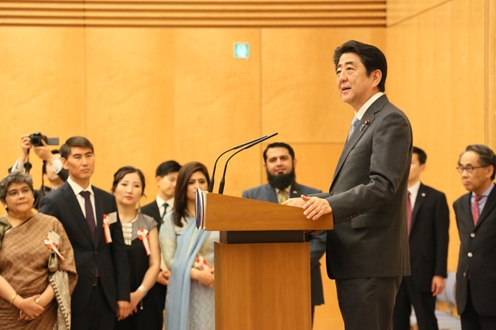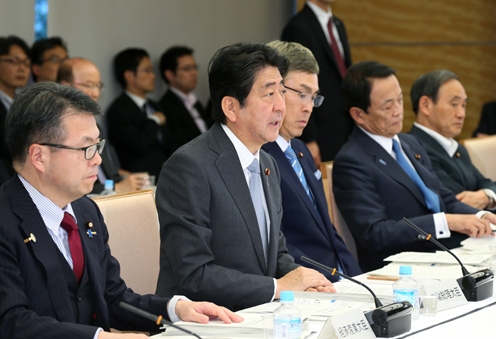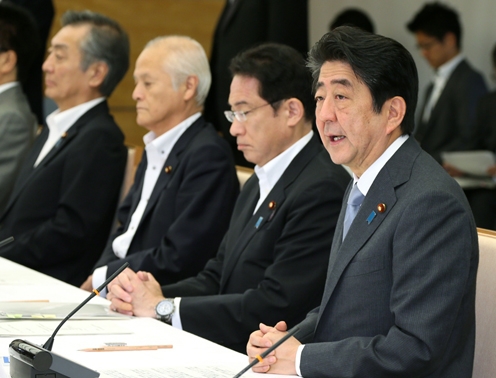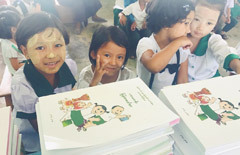The Prime Minister Hosts an Iftar with the Islamic Diplomatic Corps in Japan
Cabinet Secretariat, Friday, June 9, 2017
[Provisional Translation]
Prime Minister Shinzo Abe hosted an Iftar with the Islamic Diplomatic Corps in Japan at the Prime Minister's Office.
In his opening address, the Prime Minister said,
"Iftar is an essential event for the observers of Islam, in which they gather not only with their families but also with those close to them to enjoy a meal together after sunset during the month of Ramadan.
I am delighted to welcome so many of Japan's important friends to the Prime Minister's Office to host this Iftar today.
I place great importance on Japan's relationship with Muslim countries. Since I took office I have visited many Muslim countries and met with the leaders of those countries.
At every such opportunity, I communicated the concept that 'the best way is in the middle.' This is because the noble spirit of Islam, such as its teachings about love, tolerance, and sincerity, shares much in common with the concepts held dear by Japanese people, namely, respecting others, upholding the spirit of humility, and maintaining harmony among people. Mr. Shinkun Haku of the Democratic Party has been listening intently to my comments. In the Diet, I will continue to uphold this spirit as well.
As the world confronts violent extremism and terrorism, we must once again go back to this spirit.
I would like to conclude my remarks by expressing my wish that this occasion with our Muslim friends tonight will be an opportunity to pray for world peace and prosperity and further deepen our friendly relations."
Joint Meeting of the Council on Economic and Fiscal Policy and the Council on Investments for the Future
Cabinet Secretariat, Friday, June 9, 2017
[Provisional Translation]
Prime Minister Shinzo Abe held the joint 10th meeting of the Council on Economic and Fiscal Policy in 2017 and the 10th meeting of the Council on Investments for the Future, at the Prime Minister's Office.
At the meeting, discussion was held on the draft Basic Policies for Economic and Fiscal Management and Reform 2017, and the draft Investments for the Future Strategy 2017.
Based on the discussion, the Prime Minister said,
"I want to thank you all sincerely for compiling the Basic Policies 2017 and the Investments for the Future Strategy 2017 today.
Thanks to the initiatives of Abenomics over the last four and a half years, Japan's GDP is at the highest level ever. Employment, which is closely intertwined with the lifestyles of the people, has improved tremendously, and the trend of wage increases continues. In order to further accelerate this momentum and expand the positive cycle of growth and distribution, we will work to improve productivity through investments into human resources, in addition to the implementation of work style reform. We will also work to realize Society 5.0, which will resolve social challenges by incorporating innovation into all industries and aspects of daily life. We will steadily develop the needed initiatives to that end.
The Basic Policies and the Investments for the Future Strategy will be approved at the Cabinet meeting following this meeting. I would like to ask Minister Ishihara to cooperate with relevant ministers for the immediate implementation of the Basic Policies and the Investments for the Future Strategy.
I would like to once again extend my gratitude to the council members for their significant efforts, and request your continued cooperation towards the realization of a society in which all citizens are dynamically engaged."
Sustainable Development Goals (SDGs) Promotion Headquarters
Cabinet Secretariat, Friday, June 9, 2017
[Provisional Translation]
Prime Minister Shinzo Abe held the third meeting of the Sustainable Development Goals (SDGs) Promotion Headquarters at the Prime Minister's Office.
During the meeting, discussion was held on the progress of the initiatives for the SDGs and other matters.
Based on the discussion, the Prime Minister said,
"The Sustainable Development Goals, or the SDGs, are important initiatives which all developed and developing countries are responsible for. Based on the concept of human security, Japan will exercise leadership towards the realization of a society in which not a single person will be left behind and everyone can unleash their capabilities.
Setting our sights on the report to the United Nations (UN) in July and the UN General Assembly session in September, I would like to once again instruct the following three items.
The first concerns the realization of work style reform. The Abe administration aims to realize a society in which all citizens are dynamically engaged, i.e., an inclusive society à la japonaise. The greatest challenge in achieving that is work style reform. We will steadily advance reforms that are in line with the concept of the SDGs, including correcting the practice of working long hours and realizing equal pay for equal work.
Second is the promotion of the SDGs in the regions. This will also contribute to vitalizing local economies. I ask that relevant ministers work together to consider and implement measures that promote regional initiatives towards the achievement of the SDGs.
Third is promotion of private sector initiatives. The use of private sector know-how, technology, and financing are indispensable to the achievement of the SDGs. At the same time, it represents a great challenge for companies. The SDGs offer business opportunities.
Today, this Promotion Headquarters decided to create the Japan SDGs Award to recognize the pioneering initiatives implemented by companies and organizations. I want to further encourage SDG-related activities in the private sector and actively give greater visibility to superior initiatives.
This year's Basic Policies are once again expected to incorporate further promotion of the implementation of the SDGs. In light of this, I ask relevant ministers to accelerate initiatives for the SDGs.
I will firmly promote Japan's initiatives to the world at opportunities such as the report to the UN in July and the UN General Assembly session in September."
New Textbooks Developed with JICA Technical Cooperation Delivered to Primary Schools throughout Myanmar
JICA, Monday, June 12, 2017
New textbooks for first-grade students that were developed with JICA’s technical cooperation have been distributed to primary schools throughout Myanmar, which is advancing democratization, for the beginning of the school year, which started on June 1.
Myanmar underwent a transition from military rule to democratic government in 2011, and training human resources to build a new state is an urgent issue. Over many years, JICA has supported, in Myanmar, the promotion of the child-centered approach, which employs teaching/learning methods that emphasize learning by the child him/herself. However, because the textbooks formerly used in classrooms were developed nearly two decades ago, when those textbooks were used, there was a tendency to return to a rote style of learning.
Since 2014, JICA has supported, through the Project for Curriculum Reform at Primary Level of Basic Education (CREATE), the development of new textbooks in all subjects (Myanmar language, English, arithmetic, science, social studies, physical education, morals and civics, life skills, music and art) for all grades (one to five) at the primary level as a part of the education reform being carried out by the Government of Myanmar. Beginning with the new school year on June 1, approximately 1.3 million first-graders throughout Myanmar have started their learning with the new textbooks.
The new textbooks are designed for each student to learn to observe things with their own eyes, think, communicate and cooperate with each other in order to improve their own lives and society. The textbooks also aim to stimulate the spirit of curiosity and fun learning, while maintaining values that have been nurtured by the people of Myanmar, and respecting diversity. The teachers do not merely transmit knowledge but are required to promote independent student learning. To that end, teacher guides for all subjects were also developed and distributed to the teachers, and training for existing teachers as well as teacher training colleges was carried out throughout the country.
Under the CREATE project, approximately 40 Japanese education experts with vast experience in Japan and overseas provide multifaceted technical support in various areas such as subject content, effective teaching/learning methods, textbook editing and design, teacher training and assessment in order to establish the education system, with which the next generation of Myanmar will be created.
JICA will continue supporting the nation-building of Myanmar through improvement in quality of education, including the curriculum revision.




































